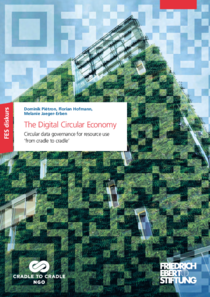The digital circular economy : Circular data governance for resource use ̀from cradle to cradleʿ

Piétron, Dominik ; Hofmann, Florian ; Jaeger-Erben, Melanie
Friedrich-Ebert-Stiftung, Bonn
Friedrich-Ebert-Stiftung - Bonn
2023
26 p.
circular economy ; natural resources ; sustainable development ; recycling of materials ; digitalisation
FES Diskurs
November 2023
Economic development
https://library.fes.de/pdf-files/a-p-b/20827.pdf
English
Bibliogr.
"Half of all greenhouse gas emissions and 90 per cent of all biodiversity losses are attributable to resource extraction, processing and manufacturing. Our linear economy, in which resources flow relentlessly from factory to incinerator, is a blind alley. Simply producing a little less waste and doing a little more recycling is not going to make any meaningful difference. If we are serious about tackling climate change and resource shortages, we will need a fully circular economy based on the cradle-tocradle principle. That means products, production and business models designed from the outset to ensure that materials and resources are able to circulate more or less endlessly. Digitalisation will be a crucial tool in that transformation. Circular value creation will require sophisticated management of material flows throughout the product lifecycle. Data is key: the more information can be digitally collected, processed, analysed and shared about composition, use, and environmental and health effects, the easier it will be to ensure that materials and products circulate optimally, and to scale up circular business models and ecosystems. The present study presents the findings of the project ‘Digitalisation and Circular Value Creation' conducted jointly by the Friedrich-Ebert-Stiftung and the Cradle to Cradle NGO. In a series of five meetings experts analysed the potential of digitalisation for realising a fully circular economy in Germany and Europe, using examples from different branches and product life-cycle phases. The objectives were to understand the (potential) role of data and digital infrastructures in different circular ecosystems, and to identify instruments suited to establishing or expanding a circular economy in different sectors..."
Digital
The ETUI is co-funded by the European Union. Views and opinions expressed are however those of the author(s) only and do not necessarily reflect those of the European Union or the ETUI.